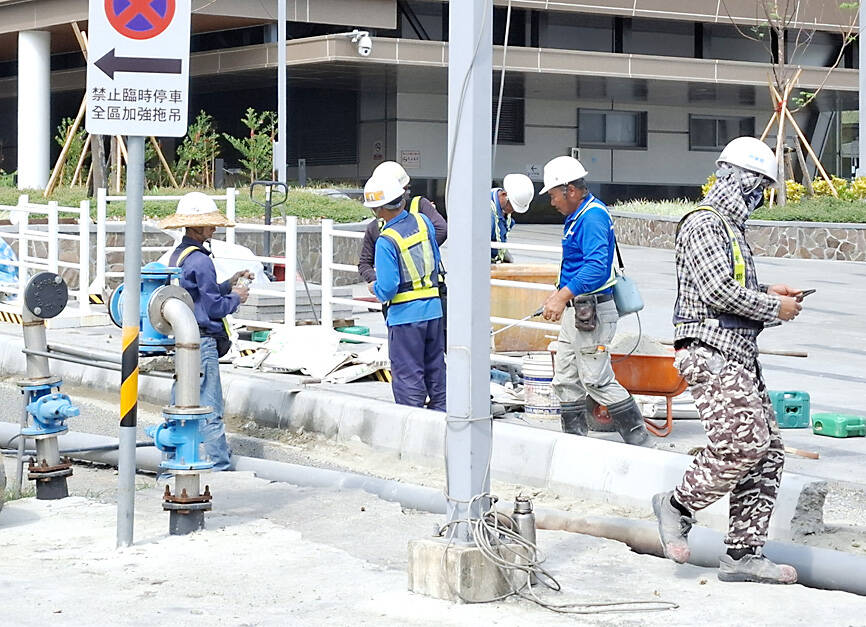The average monthly regular wage in October gained 2.63 percent from a year earlier to NT$46,455, while the average total monthly wage — including overtime pay, performance-based commissions and bonuses — increased 3.41 percent to NT$53,227, the Directorate-General of Budget, Accounting and Statistics (DGBAS) said yesterday.
The data represented a mild slowdown from September — when companies issued bonuses in observance of the Mid-Autumn Festival — but supported a continued improvement that beat inflation, Census Department Deputy Director Tan Wen-ling (譚文玲) said at a news conference in Taipei.
In the first 10 months of this year, the average real monthly wage and the average total monthly wage picked up 0.5 percent and 1.82 percent each to NT$46,371 and NT$61,529 respectively, after factoring in consumer price hikes for the same period, Tan said.

Photo: Hou Cheng-hsu, Taipei Times
Improving business underpinned the wage hikes as evidenced by the amount of overtime hours, which hit 24.3 hours per month at local makers of electronic components, the strongest in 51 years, she said.
“Chip demand from artificial intelligence [AI], high-performance computing and cloud services is gaining momentum without any signs of mitigation” she said.
Taiwan is home to the world’s major suppliers of advanced chips used in AI, she said.
Wage increases were most evident at financial institutes at 6 percent, followed by shipping and warehousing service providers at 3.58 percent and real-estate brokers at 3.36 percent, the DGBAS said.
The median wage — a better gauge of typical regular pay as it is not skewed by extremes of high or low wages — stood at NT$37,244, an increase of 2.88 percent from a year earlier, it said.
The monthly figure for workers with an undergraduate education was NT$39,277 and grew to NT$64,044 for workers with graduate diplomas, it said.
Male workers had higher median wages of NT$38,862 a month than female workers’ NT$35,183, it said.
People aged below 30 and above 65 had lower wages of NT$30,867 and NT$37,794 a month respectively, it said, citing a lack of experience for the former group and age for the latter.
Elsewhere, Kelvin Lau (劉建恆), senior economist at Standard Chartered Bank in Hong Kong, yesterday said that the AI craze might continue to drive Taiwan’s GDP growth, which would reach 2.3 percent next year, from this year’s estimated 4.2 percent.
US technology giants have indicated plans to step up AI spending, which would benefit Taiwanese firms on the supply chain, he said during a video conference.
However, non-tech products would remain weighed, by an expected economic slowdown in the US, China and Europe, he said.
The upcoming administration of US president-elect Donald Trump would raise tariffs on Chinese goods and indirectly affect Taiwanese firms, he said.
Taiwan’s strong trade surplus against the US could fuel tensions and it could seek appeasement by increasing purchases of agricultural products and military weapons from the US, he added.

MULTIFACETED: A task force has analyzed possible scenarios and created responses to assist domestic industries in dealing with US tariffs, the economics minister said The Executive Yuan is tomorrow to announce countermeasures to US President Donald Trump’s planned reciprocal tariffs, although the details of the plan would not be made public until Monday next week, Minister of Economic Affairs J.W. Kuo (郭智輝) said yesterday. The Cabinet established an economic and trade task force in November last year to deal with US trade and tariff related issues, Kuo told reporters outside the legislature in Taipei. The task force has been analyzing and evaluating all kinds of scenarios to identify suitable responses and determine how best to assist domestic industries in managing the effects of Trump’s tariffs, he

TIGHT-LIPPED: UMC said it had no merger plans at the moment, after Nikkei Asia reported that the firm and GlobalFoundries were considering restarting merger talks United Microelectronics Corp (UMC, 聯電), the world’s No. 4 contract chipmaker, yesterday launched a new US$5 billion 12-inch chip factory in Singapore as part of its latest effort to diversify its manufacturing footprint amid growing geopolitical risks. The new factory, adjacent to UMC’s existing Singapore fab in the Pasir Res Wafer Fab Park, is scheduled to enter volume production next year, utilizing mature 22-nanometer and 28-nanometer process technologies, UMC said in a statement. The company plans to invest US$5 billion during the first phase of the new fab, which would have an installed capacity of 30,000 12-inch wafers per month, it said. The

Taiwan’s official purchasing managers’ index (PMI) last month rose 0.2 percentage points to 54.2, in a second consecutive month of expansion, thanks to front-loading demand intended to avoid potential US tariff hikes, the Chung-Hua Institution for Economic Research (CIER, 中華經濟研究院) said yesterday. While short-term demand appeared robust, uncertainties rose due to US President Donald Trump’s unpredictable trade policy, CIER president Lien Hsien-ming (連賢明) told a news conference in Taipei. Taiwan’s economy this year would be characterized by high-level fluctuations and the volatility would be wilder than most expect, Lien said Demand for electronics, particularly semiconductors, continues to benefit from US technology giants’ effort

‘SWASTICAR’: Tesla CEO Elon Musk’s close association with Donald Trump has prompted opponents to brand him a ‘Nazi’ and resulted in a dramatic drop in sales Demonstrators descended on Tesla Inc dealerships across the US, and in Europe and Canada on Saturday to protest company chief Elon Musk, who has amassed extraordinary power as a top adviser to US President Donald Trump. Waving signs with messages such as “Musk is stealing our money” and “Reclaim our country,” the protests largely took place peacefully following fiery episodes of vandalism on Tesla vehicles, dealerships and other facilities in recent weeks that US officials have denounced as terrorism. Hundreds rallied on Saturday outside the Tesla dealership in Manhattan. Some blasted Musk, the world’s richest man, while others demanded the shuttering of his